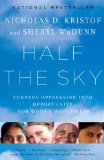Summary | Excerpt | Reading Guide | Reviews | Beyond the Book | Readalikes | Genres & Themes | Author Bio
Turning Oppression into Opportunity for Women Worldwide

Critics' Opinion:
Readers' Opinion:
First Published:
Sep 2009, 320 pages
Paperback:
Jun 2010, 320 pages
 Book Reviewed by:
Book Reviewed by:
Beverly Melven
Buy This Book
When a prominent dissident was arrested in China, we would write a front-page article; when 100,000 girls were routinely kidnapped and trafficked into brothels, we didn't even consider it news. Partly that is because we journalists tend to be good at covering events that happen on a particular day, but we slip at covering events that happen every day—such as the quotidian cruelties inflicted on women and girls.We journalists weren't the only ones who dropped the ball on this subject: Less than 1 percent of U.S. foreign aid is specifically targeted to women and girls.
Amartya Sen, the ebullient Nobel Prize–winning economist, has developed a gauge of gender inequality that is a striking reminder of the stakes involved. "More than 100 million women are missing," Sen wrote in a classic essay in 1990 in The New York Review of Books, spurring a new field of research. Sen noted that in normal circumstances women live longer than men, and so there are more females than males in much of the world. Even poor regions like most of Latin America and much of Africa have more females than males.Yet in places where girls have a deeply unequal status, they vanish. China has 107 males for every 100 females in its overall population (and an even greater disproportion among newborns), India has 108, and Pakistan has 111. This has nothing to do with biology, and indeed the state of Kerala in the southwest of India, which has championed female education and equality, has the same excess of females that exists in the United States.
The implication of the sex ratios, Professor Sen found, is that about 107 million females are missing from the globe today.Follow-up studies have calculated the number slightly differently, deriving alternative figures for "missing women"of between 60 million and 101 million. Every year, at least another 2 million girls worldwide disappear because of gender discrimination.
In the wealthy countries of the West, discrimination is usually a matter of unequal pay or underfunded sports teams or unwanted touching from a boss. In contrast, in much of the world discrimination is lethal. In India, for example, mothers are less likely to take their daughters to be vaccinated than their sons—that alone accounts for one fifth of India's missing females—while studies have found that, on average, girls are brought to the hospital only when they are sicker than boys taken to the hospital. All told, girls in India from one to five years of age are 50 percent more likely to die than boys the same age.The best estimate is that a little Indian girl dies from discrimination every four minutes.
A big, bearded Afghan named Sedanshah once told us that his wife and son were sick. He wanted both to survive, he said, but his priorities were clear: A son is an indispensable treasure, while a wife is replaceable. He had purchased medication for the boy alone. "She's always sick," he gruffly said of his wife, "so it's not worth buying medicine for her."
Modernization and technology can aggravate the discrimination. Since the 1990s, the spread of ultrasound machines has allowed pregnant women to find out the sex of their fetuses—and then get abortions if they are female. In Fujian Province, China, a peasant raved to us about ultrasound: "We don't have to have daughters anymore!"
To prevent sex-selective abortion, China and India now bar doctors and ultrasound technicians from telling a pregnant woman the sex of her fetus.Yet that is a flawed solution. Research shows that when parents are banned from selectively aborting female fetuses, more of their daughters die as infants. Mothers do not deliberately dispatch infant girls they are obligated to give birth to, but they are lackadaisical in caring for them. A development economist at Brown University, Nancy Qian, quantified the wrenching trade-off: On average, the deaths of fifteen infant girls can be avoided by allowing one hundred female fetuses to be selectively aborted.
Excerpted from Half the Sky by Nicholas D. Kristof and Sheryl WuDunn Copyright © 2009 by Nicholas D. Kristof. Excerpted by permission of Knopf, a division of Random House, Inc. All rights reserved. No part of this excerpt may be reproduced or reprinted without permission in writing from the publisher.





The Flower Sisters
by Michelle Collins Anderson
From the new Fannie Flagg of the Ozarks, a richly-woven story of family, forgiveness, and reinvention.

The House on Biscayne Bay
by Chanel Cleeton
As death stalks a gothic mansion in Miami, the lives of two women intertwine as the past and present collide.

The Funeral Cryer by Wenyan Lu
Debut novelist Wenyan Lu brings us this witty yet profound story about one woman's midlife reawakening in contemporary rural China.
Your guide toexceptional books
BookBrowse seeks out and recommends the best in contemporary fiction and nonfiction—books that not only engage and entertain but also deepen our understanding of ourselves and the world around us.